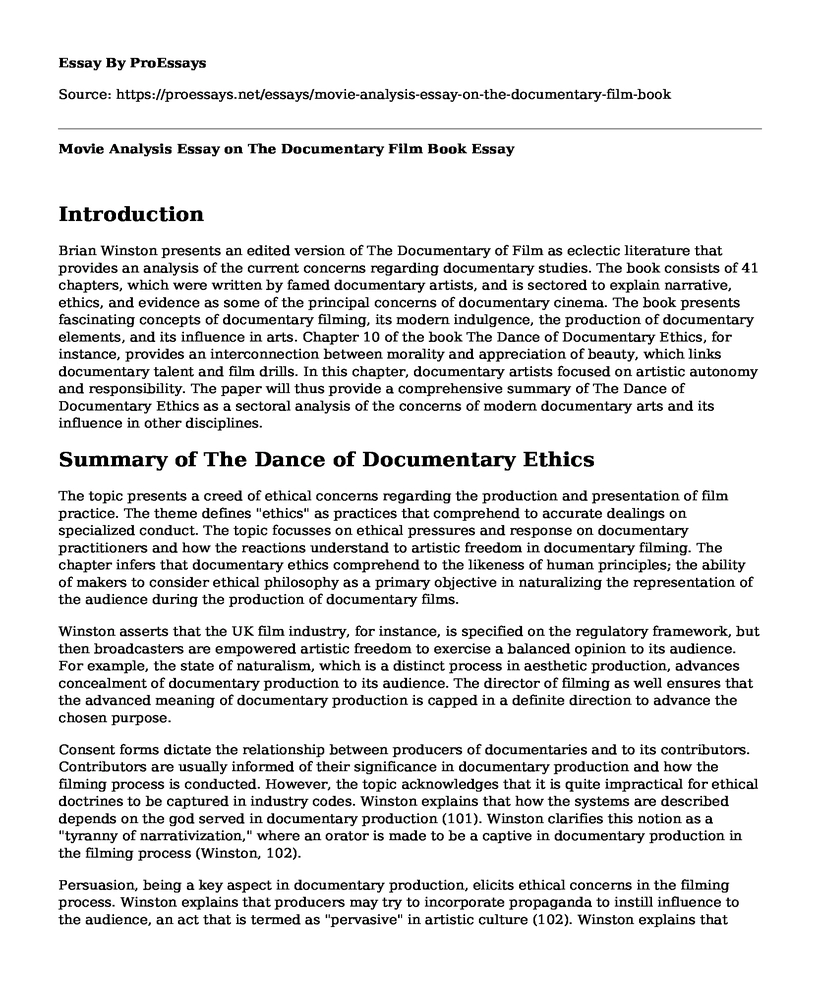Introduction
Brian Winston presents an edited version of The Documentary of Film as eclectic literature that provides an analysis of the current concerns regarding documentary studies. The book consists of 41 chapters, which were written by famed documentary artists, and is sectored to explain narrative, ethics, and evidence as some of the principal concerns of documentary cinema. The book presents fascinating concepts of documentary filming, its modern indulgence, the production of documentary elements, and its influence in arts. Chapter 10 of the book The Dance of Documentary Ethics, for instance, provides an interconnection between morality and appreciation of beauty, which links documentary talent and film drills. In this chapter, documentary artists focused on artistic autonomy and responsibility. The paper will thus provide a comprehensive summary of The Dance of Documentary Ethics as a sectoral analysis of the concerns of modern documentary arts and its influence in other disciplines.
Summary of The Dance of Documentary Ethics
The topic presents a creed of ethical concerns regarding the production and presentation of film practice. The theme defines "ethics" as practices that comprehend to accurate dealings on specialized conduct. The topic focusses on ethical pressures and response on documentary practitioners and how the reactions understand to artistic freedom in documentary filming. The chapter infers that documentary ethics comprehend to the likeness of human principles; the ability of makers to consider ethical philosophy as a primary objective in naturalizing the representation of the audience during the production of documentary films.
Winston asserts that the UK film industry, for instance, is specified on the regulatory framework, but then broadcasters are empowered artistic freedom to exercise a balanced opinion to its audience. For example, the state of naturalism, which is a distinct process in aesthetic production, advances concealment of documentary production to its audience. The director of filming as well ensures that the advanced meaning of documentary production is capped in a definite direction to advance the chosen purpose.
Consent forms dictate the relationship between producers of documentaries and to its contributors. Contributors are usually informed of their significance in documentary production and how the filming process is conducted. However, the topic acknowledges that it is quite impractical for ethical doctrines to be captured in industry codes. Winston explains that how the systems are described depends on the god served in documentary production (101). Winston clarifies this notion as a "tyranny of narrativization," where an orator is made to be a captive in documentary production in the filming process (Winston, 102).
Persuasion, being a key aspect in documentary production, elicits ethical concerns in the filming process. Winston explains that producers may try to incorporate propaganda to instill influence to the audience, an act that is termed as "pervasive" in artistic culture (102). Winston explains that truth is what communicates the motivation of filmmakers, and it is in this truth that invention arises in the creative industry (104). If artistic vision is captured on troubling ethical structures, then it is significant to consider that the resulting presentation of a film practice is principled on the confines of a narrative documentary (Winston, 105). Winston claims that the ability of filmmakers to aspire transparency on the production and presentation of documentary films represents the highest sense of ethical consideration (107). The attentive principle that underlies this concept is social implements that define morality and artistic freedom that governs the conduct of filmmakers.
As explained by Winston, artistic freedom may create devious ambitions on the part of the artists, enabling them to suppress contributors and the audience on matters of ethical grounds. Such questions stimulate scholars to advance checks to enhance the propagation of noble attire when it comes to the issues of documentary filming.
Works Cited
Winston, Brian. The documentary film book. British Film Institute, 2013.
Cite this page
Movie Analysis Essay on The Documentary Film Book. (2023, Mar 17). Retrieved from https://proessays.net/essays/movie-analysis-essay-on-the-documentary-film-book
If you are the original author of this essay and no longer wish to have it published on the ProEssays website, please click below to request its removal:







